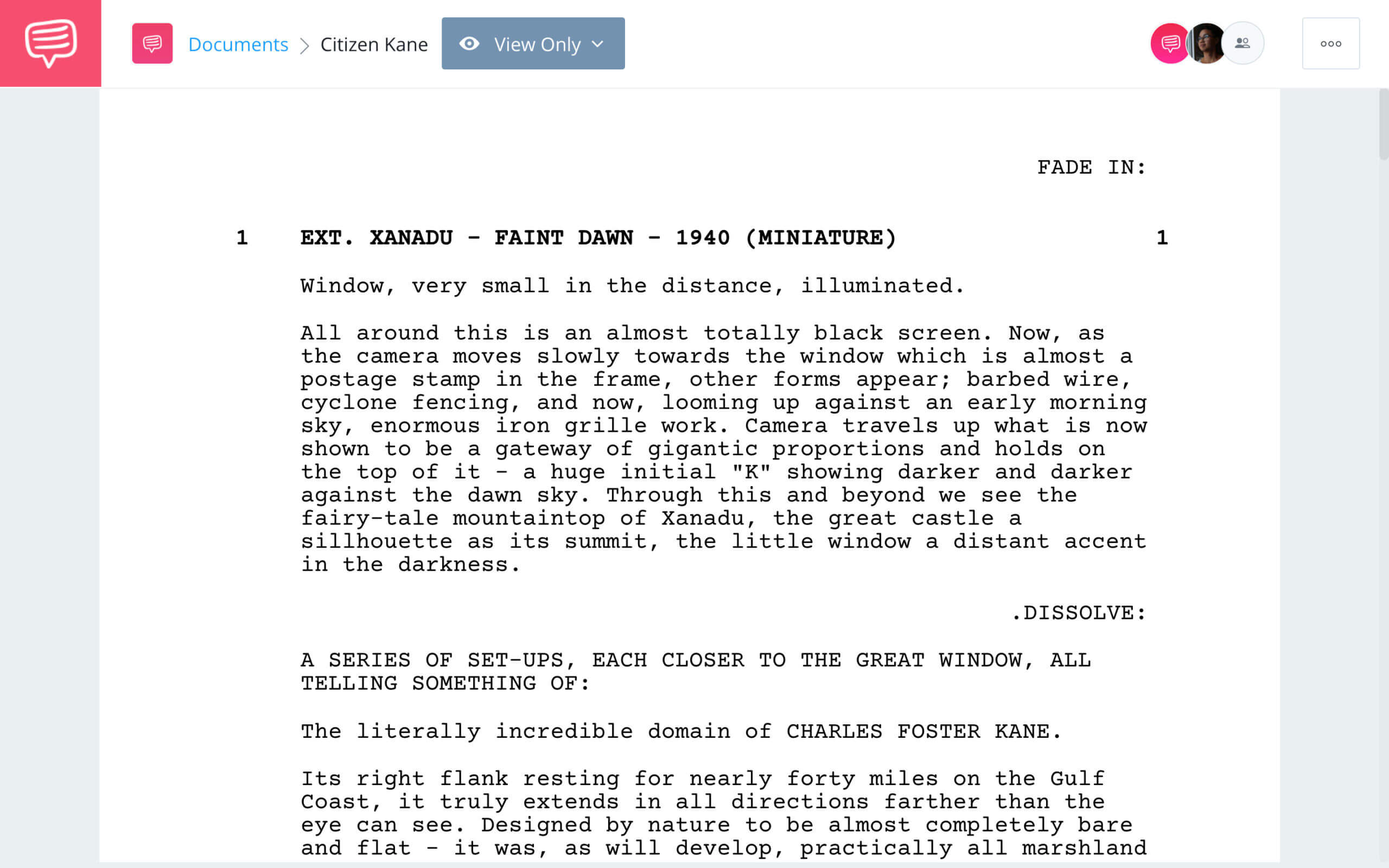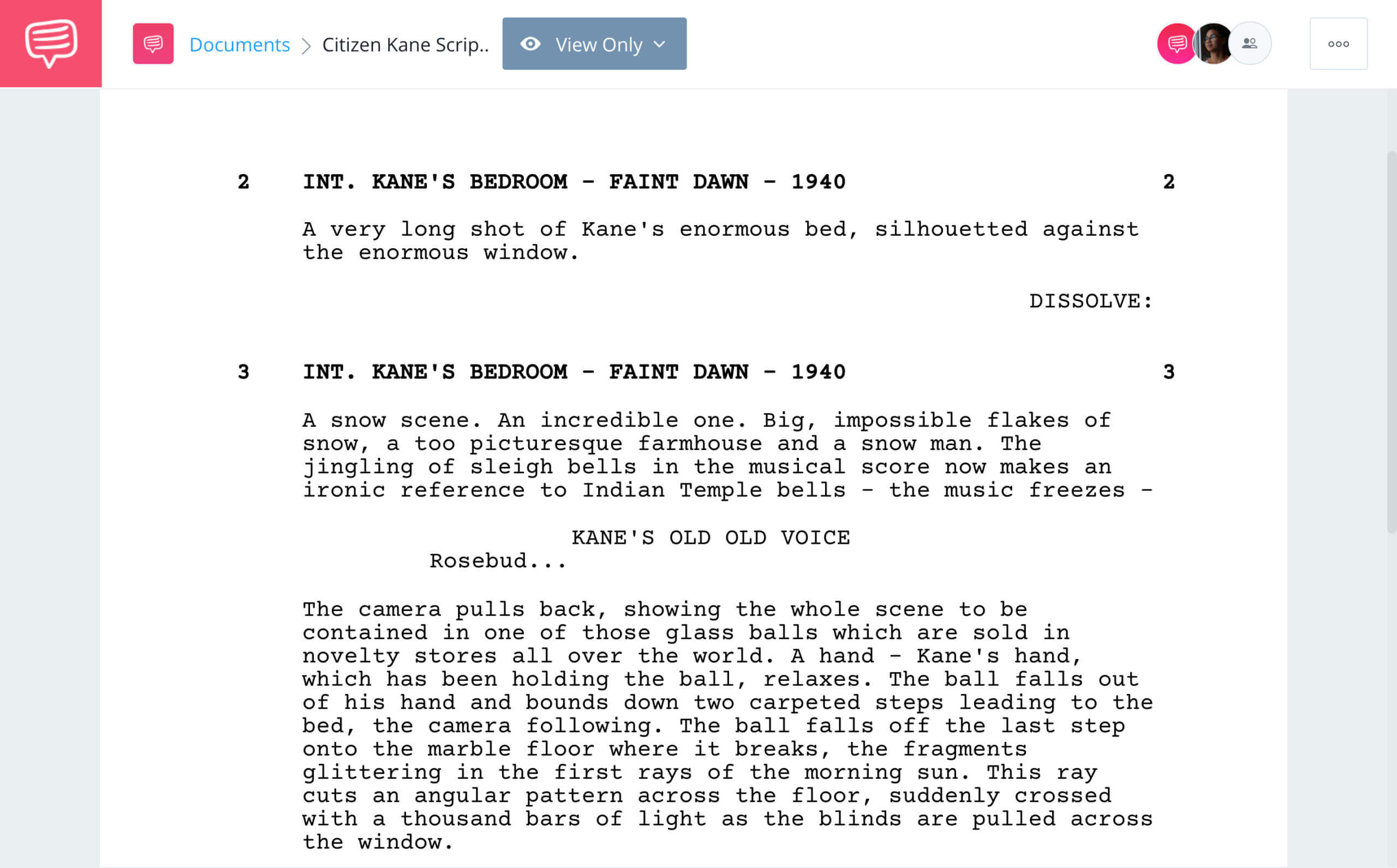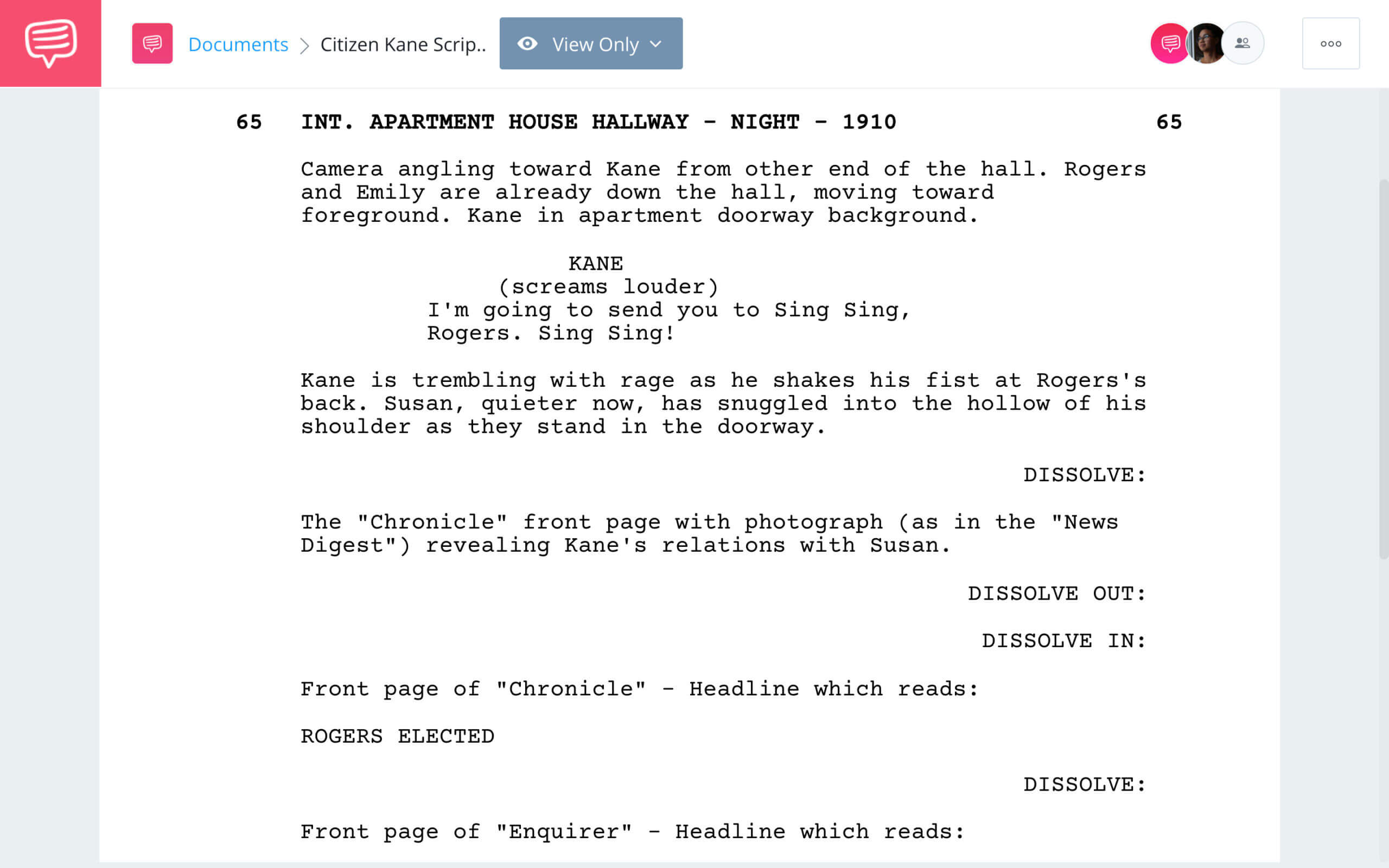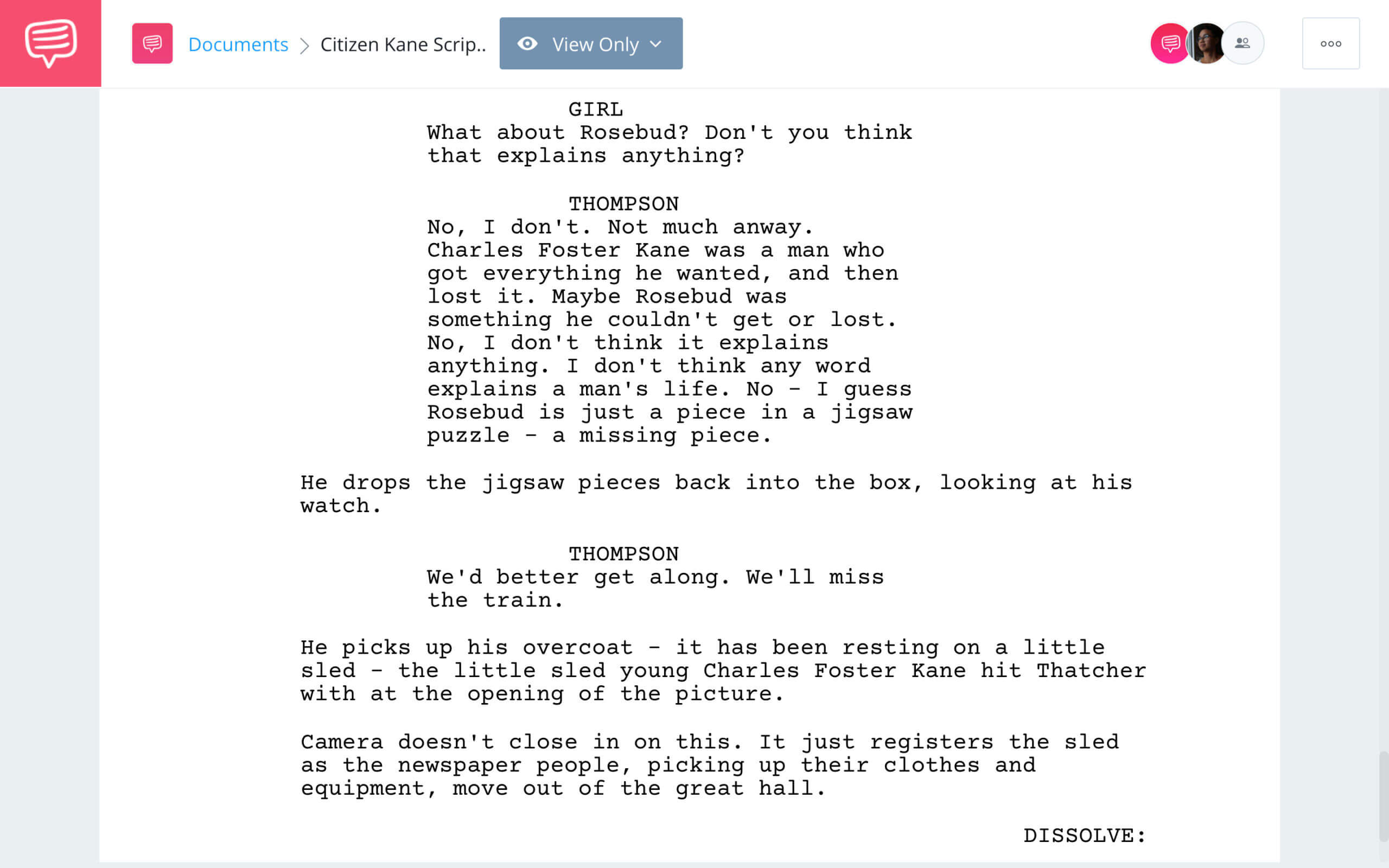You cannot capture a man’s entire life in two hours. All you can hope is to leave the impression of one,” says Gary Oldman in David Fincher’s oeuvre to Citizen Kane. But whose life is Citizen Kane an impression of? Charles Foster Kane? William Randolph Hearst? Orson Welles? Or Herman Mankiewicz? Perhaps it’s an impression of none of them; or all of them. We’re going to break down the Citizen Kane script by summarizing its plot and by analyzing its characters. We’ll ask questions like: who wrote Citizen Kane? And what is Citizen Kane about? By the end, you’ll know why Citizen Kane is considered by many to be the greatest screenplay ever written.
WHO WROTE citizen kane?
Written by Orson Welles and Herman J. Mankiewicz
Orson Welles was an American filmmaker, theater director, radio producer, and actor who has been cited by many as one of the greatest creative forces in the history of entertainment. His most famous works include The War of the Worlds (radio production), Citizen Kane, and Touch of Evil.
Herman J. Mankiewicz, also known as Mank, was an American screenwriter and drama critic. Mank worked on dozens (if not hundreds) of films as the Head of Paramount’s scenario department.
STORY BREAKDOWN
STRUCTURE OF THE CITIZEN KANE SCREENPLAY
Here is the story structure for the Citizen Kane screenplay:
Inciting Incident
Newspaper tycoon Charles Foster Kane dies alone at his indomitable Xanadu estate – but before he relinquishes his final breath, he whispers the word “rosebud” in ear-shot of the bedside nurse.
Exposition
Newsreel footage shows the abbreviated life of Kane, from rural reservoirs to corporate coliseums; from populist mouthpiece to solitary prisoner. He was the most public man in America until he retreated to Xanadu.
Plot Point I
A reporter named Thompson is tasked with deciphering the meaning of Kane’s final word “rosebud.” He sets out to speak with three people in order to learn more: Kane’s second-wife Susan Alexander, Kane’s former colleague Bernstein, and Kane’s best-friend Jedidiah Leland.
Flashback I
Thompson reads a report about Kane’s youth and is transported back in time.
In 1870 Colorado, Mary Kane signs her land away and asks the bank to take custodianship of her son Charles. Charles is whisked away by an envoy named Thatcher and promised a massive inheritance at age 25.
Flashback II
In his early 20s, Kane takes command of “The Enquirer” – a New York sensationalist news outlet with socialist leanings.
Midpoint
Bernstein tells Thompson a story about how Kane once wrote a negative review of Susan’s opera debut and published it under Leland’s name.
Flashback II – Part II
Kane overhauls The Enquirer by transforming it into “the people’s newspaper,” and by poaching the best reporters in town. He also ascends to a higher social status by marrying the President’s niece, Emily Norton.
Plot Point II
Thompson meets with Leland, who tells him a story about when Kane viciously attacked the President after a disagreement on oil rights; indirectly leading to an assassination attempt.
Flashback III
Kane runs for governor but loses when his opponent – Boss Edward Rogers (Jim Gettys in the movie) – publicizes his affair with Susan. A few years later, Kane fires Leland.
Plot Point III
Thompson meets with Susan, who tells him the story of how she first met Kane – and how after the failure of her singing career, Kane began to build Xanadu.
Flashback Build Up
Kane and Susan’s relationship deteriorates within the confines of Xanadu.
Flashback Climax
In the heat of argument, Kane strikes Susan, which prompts her to leave him.
Finale
Thompson travels to Xanadu to see what remains of Kane’s estate; finding nothing, he ventures off with no more knowledge of what Rosebud meant than what he started with.
Denouement
The “junk” of Kane’s estate is thrown into a fire. Enveloped in the flames is Kane’s childhood sled, engraved with a single word, Rosebud.
Citizen Kane Script Takeaway #1
Citizen Kane quotes are unforgettable
Now that we’ve reviewed the Citizen Kane summary, let’s move on to some of the film’s greatest quotes.
Citizen Kane is widely regarded as the “greatest film ever made.” As such, many of its quotes are regarded with especial esteem. We imported the Citizen Kane script into StudioBinder’s screenwriting software to take a look at some of the best Citizen Kane quotes.
Of course, the most famous quote from the film – which is ranked #17 on AFI’s 100 years… 100 movie quotes list – is the word “rosebud.” Let’s take a look at the rosebud scene from Citizen Kane to see what makes it so special.
As you’re reading, think about how the scene is paced and how it crescendos with Kane’s final word.
Citizen Kane Plot Building • Read the Citizen Kane Opening Scene
Over the years, thousands of screenwriters have attempted to imitate the opening scene of Citizen Kane, but few have done so successfully. The word “rosebud” succeeds as a plot-driver because it’s not a MacGuffin – it’s more of a literary “start-part,” something that is given mysterious importance, yet ultimately proves to be profound.
Rosebud begs us to ask the question: what does it mean? The pursuit of Rosebud’s meaning serves as the basis for the Citizen Kane plot, which is a masterclass lesson in effective screenwriting.
The opening scene isn’t just famous for its protagonist’s last word though, it’s also famous for its pioneering use of film dissolves. For more on how these dissolves were communicated in a visual sense, check out the clip below.
Citizen Kane Plot Foundation • Opening Scene
The opening scene includes just one great Citizen Kane quote. Here are some of the other best Citizen Kane quotes:
- “It's a tough thing to do in a newsreel. Seventy years of a man's life.”
- “But how is he different from Ford? Or Hearst for that matter? Or Rockefeller — or John Doe?”
- “Here's a man who might have been President. He's been loved and hated and talked about as much as any man in our time — but when he comes to die, he's got something on his mind called "Rosebud." What does that mean?”
- “I'll let you in on a little secret, it is also my pleasure — to see to it that decent, hard-working people of this city are not robbed blind by a group of money-mad pirates because, God help them, they have no one to look after their interests!”
- “Just old age. It's the only disease, Mr. Thompson, you don't look forward to being cured of.”
- “Charlie lived on power and the excitement of using it — but he didn't believe in anything except Charlie Kane.”
- “Remember the working man? You used to defend him quite a good deal. Well, he's turning into something called organized labor and you don't like that at all.”
- “To love on my terms. Those are the only terms anybody knows…his own.”
- “If the people of this state learn what I found out this week, he wouldn't have a chance to — he couldn't be elected Dog Catcher.”
- “Don't you worry about me. I'm Charles Foster Kane. I'm no cheap, crooked politician, trying to save himself from the consequences of his crimes.”
- “That "Rosebud" — that don't mean anything. I heard him say it. He just said "Rosebud" and then he dropped that glass ball and it broke on the floor. He didn't say anything about that, so I knew he was dead — He said all kind of things I couldn't make out.”
- “I don't think any word explains a man's life.”
Citizen Kane Script Takeaway #2
Citizen Kane is a story about America
Citizen Kane encapsulated themes of American culture better than most movies before it. That’s because nothing was safe from Mank and Welles’s scope; not Wall Street, not The White House, and certainly not Hollywood.
Mank and Welles built a multidimensional portrait of the target they painted. Charles Foster Kane was neither good nor evil, neither kind nor unsympathetic – he was complex, changing, growing, and decaying; much like us all.
If Hearst was upset with the insinuation that he bore resemblance to Kane, it was because he was insecure with himself. Kane was a character that capitalized on the power he was given, and earned the ire he received. To see him either as a condemnation of corporate greed or as a messianic social figure is to do a disservice to his characterization.
Let’s review an excerpt from the Citizen Kane script to see how Welles and Mank exposed themes of American insecurity and how those same themes still ring true today.
Citizen Kane Movie Script • Kane vs. Boss Jim Gettys
Everything in American politics is diametric. You either support or condemn; you either exalt or despise; and ultimately you either win or lose. And the loser often cries “fraud at the polls” to sow doubt in the mind of the American public.
To insinuate Kane’s insecurity attributed to any one man would be absurd – not just in politics, nor industry, nor education, nor the playground; a loser will often cry “cheat” at the peril of loss.
Kane deserved to lose his gubernatorial race. Not because he lied to his wife, but because he lied to himself. His pursuit of “justice for the working man” wasn’t built upon noble ideals but rather an unquenchable need for love. It’s because of this that we regard his characterization as perhaps the finest fictional representation of populism in cinema history.
Let’s review the “Kane vs. Boss Jim Gettys” scene from the final-cut. As you’re watching, think about how the scene is different in the film compared to the script – and pay attention to how the filmmaking exaggerates the drama.
Citizen Kane Screenplay to Screen • Kane vs Boss Jim Gettys
This scene is one of the best examples of how to use chiaroscuro lighting in film, how to block and stage a scene, and how to write great movie dialogue. It’s also a microcosm of America’s dirty politics, in and out of Washington.
Citizen Kane Script Takeaway #3
The Citizen Kane ending is perfect
“Charles Foster Kane was a man who got everything he wanted and then lost it. Maybe Rosebud was something he couldn’t get or something he lost. Anyways, it wouldn’t have explained anything. I don’t think any word can explain a man’s life. No, I guess Rosebud is just a piece in a jigsaw puzzle – a missing piece.”
What is rosebud? Let’s read through the Citizen Kane ending again with a special focus on rosebud.
Citizen Kane Screenplay • Read the Citizen Kane Ending
To me, Rosebud is a symbol for forlorn desire. It’s everything Kane had taken away from him; his mother, his youth, and his understanding of love. But Welles and Mank never outrightly tell us “what Rosebud means;” instead they show us it was the name of Kane’s childhood sled.
Let’s check out the clip from the final-cut to see how Welles and the production designers built a labyrinthian set for the film’s final scene.
Citizen Kane Screenplay to Screen • Watch the Citizen Kane Ending
At the end of a man’s life, there lies a score of all the good, all the bad, all the gained, and all the lost – and although that may amount to a considerable sum, there will always be an outlier remaining. For Charles Foster Kane, that outlier was rosebud. For you, it may be something else. But whatever it is, it will likely be something you’d never expect, something tucked deep away in your imprisoning subconscious.
It’s because of this forced introspection that we consider Citizen Kane to be one of the greatest stories ever-told – meditative, harrowing, yet utterly uniting.
Related Posts
UP NEXT
Read and download more scripts
Citizen Kane is a perfect example of how to take an intimate character drama and turn it into a universal affair. If you want to continue reading screenplays, we have similar titles like The Godfather, Pulp Fiction, and 12 Angry Men in our screenplay database. Browse and download PDFs for all of our scripts as you read, write and practice your craft to become the next great screenwriter.




